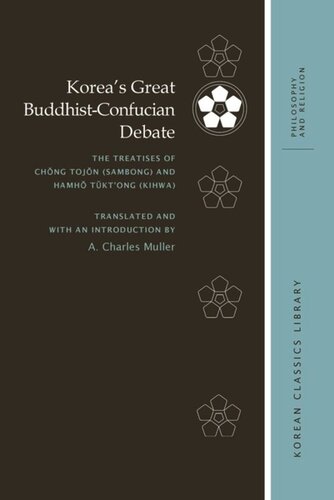

Most ebook files are in PDF format, so you can easily read them using various software such as Foxit Reader or directly on the Google Chrome browser.
Some ebook files are released by publishers in other formats such as .awz, .mobi, .epub, .fb2, etc. You may need to install specific software to read these formats on mobile/PC, such as Calibre.
Please read the tutorial at this link: https://ebookbell.com/faq
We offer FREE conversion to the popular formats you request; however, this may take some time. Therefore, right after payment, please email us, and we will try to provide the service as quickly as possible.
For some exceptional file formats or broken links (if any), please refrain from opening any disputes. Instead, email us first, and we will try to assist within a maximum of 6 hours.
EbookBell Team

5.0
38 reviewsThis volume makes available in English the seminal treatises in Korea's greatest interreligious debate of the fourteenth and fifteenth centuries. On Mind, Material Force, and Principle and An Array of Critiques of Buddhism by Confucian statesman Chŏng Tojŏn (1342–1398) and Exposition of Orthodoxy by Sŏn monk Kihwa (1376–1433) are presented here with extensive annotation. A substantial introduction provides a summary and analysis of the philosophical positions of both Neo-Confucianism and Buddhism as well as a germane history of the interactions between these two traditions in East Asia, offering insight into religious tensions that persist to this day.
Translator A. Charles Muller shows how, from the time Confucianism and Buddhism met in China, these thought systems existed, along with Daoism, in a competing relationship that featured significant mutual influence. A confrontative situation eventually developed in China, wherein Confucian leaders began to criticize Buddhism. During the late-Koryŏ and early-Chosŏn periods in Korea, the Neo-Confucian polemic became the driving force in the movement to oust Buddhism from its position as Korea's state religion. In his essays, Chŏng drew together the gamut of arguments that had been made against Buddhism throughout its long history in Korea. Kihwa's essay met Neo-Confucian contentions with an articulate Buddhist response. Thus, in a rare moment in the history of religions, a true philosophical debate ensued.
This debate was made possible based upon the two religions' shared philosophical paradigm: essence-function (ch'e-yong). This traditional East Asian way of interpreting society, events, phenomena, human beings, and the world understands all things to have both essence and function, two contrasting yet wholly contiguous and mutually containing components. All three East Asian traditions took this as their underlying philosophical paradigm, and it is through this paradigm that they evaluated and criticized each other's doctrines and practices.
Specialists in philosophy, religion, and Korean studies will appreciate Muller's exploration of this pivotal moment in Korean intellectual history. Because it includes a broad overview of the interactive history of East Asian religions, this book can also serve as a general introduction to East Asian philosophical thought.